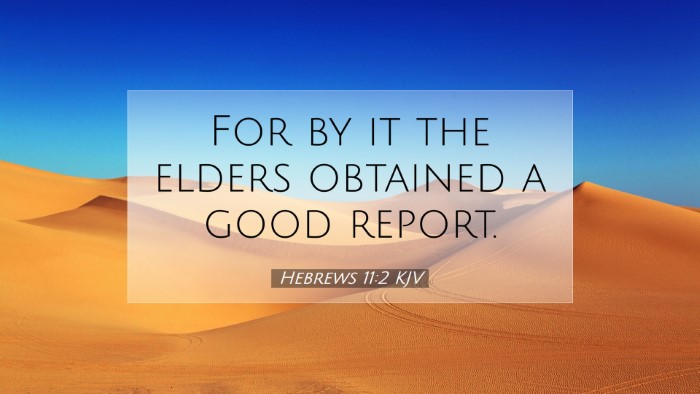Commentary on Hebrews 11:2
Verse: "For by it the elders obtained a good report."
Introduction
This passage, although concise, serves as an essential bridge in the discourse of faith. Hebrews 11 serves as a testament to the evidence and reality of faith, particularly in contrasting the visible world with the spiritual realm.
Contextual Overview
The epistle to the Hebrews is unique in its audience and purpose. It is directed towards Jewish believers who faced persecution and were tempted to revert to Judaism. The author emphasizes Christ’s superiority and the new covenant's supremacy. Within this theological framework, the definition of faith as the assurance of things hoped for and the conviction of things not seen precedes a discussion of the faith exhibited by biblical figures.
Exegesis of Hebrews 11:2
Hebrews 11:2 summarizes the essence of faith exhibited by the "elders" or the patriarchs of old. Matthew Henry highlights that the “elders” can be understood as the notable figures in the Old Testament who lived by faith and whose stories are recounted in this chapter. This verse signifies that they achieved a testimony, often referred to as a "good report," which is not merely a commendation from men but, more importantly, a divine affirmation of their faith.
Insights from Matthew Henry
Matthew Henry elaborates that the "good report" reflects the unique acknowledgment from God, whose evaluation trumps human judgment. The testimony given to these heroes of faith is grounded in their actions, which demonstrated complete reliance on God despite challenges. Such faith led to a deeper relationship with God and provided a model for future believers.
Insights from Albert Barnes
Albert Barnes further clarifies that this commendation is rooted in the pursuit of truth and righteousness. He points out that the examples set by the "elders"—figures like Noah, Abraham, and Moses—illustrate that faith in God often results in a legacy that stands the test of time. Their faith led to consequential actions that God rewarded with His approval, suggesting that faith is not passive; it inspires and moves one to tangible deeds.
Insights from Adam Clarke
In his commentary, Adam Clarke emphasizes the significance of the term "elders," suggesting it denotes leaders who were exemplary in their faith, capable of inspiring others. These leaders, through their faith, shaped the history of God's people. Clarke notes that the "good report" entails divine approval, which serves as both a comfort and challenge to the contemporary reader, prompting reflection on one's own faith journey.
Theological Implications
This verse encourages pastors, students, and scholars to consider the nature of faith and its fruits. The "good report" not only affirms the characters of the past but also serves as a motivational call to emulate their trust in God. The continual recitation of their stories throughout Scripture reinforces the timeless nature of faith as a core component of spiritual life.
Faith as Evidence
- Living Testimonies: Each character mentioned in Hebrews 11 lived by faith, showcasing the necessity of action aligned with belief.
- Assurance of Hope: Faith is positioned as the assurance of things hoped for—signifying that believers today are called to trust in God’s promises actively.
- Perspective on Life: Faith offers a heavenly perspective, inviting believers to look beyond the temporal and grasp the eternal.
Applications for Today
For the modern believer, Hebrews 11:2 invites a deep examination of one's own faith. The questions arise: What kind of report will our lives give? How can faith manifest itself in today's challenges? The enumeration of the elders invites individuals to bring their struggles before God, demonstrating that faith is that which compels us to trust where evidence may fail.
Conclusion
Hebrews 11:2 serves not only as a reflection of past giants of faith but also as an exhortation for the present. It beckons believers to engage in their faith authentically and earnestly so that they, too, might obtain a good report from God. In a world that often challenges faith, this stands as both an encouragement and a call to action for leaders and ordinary believers alike.


